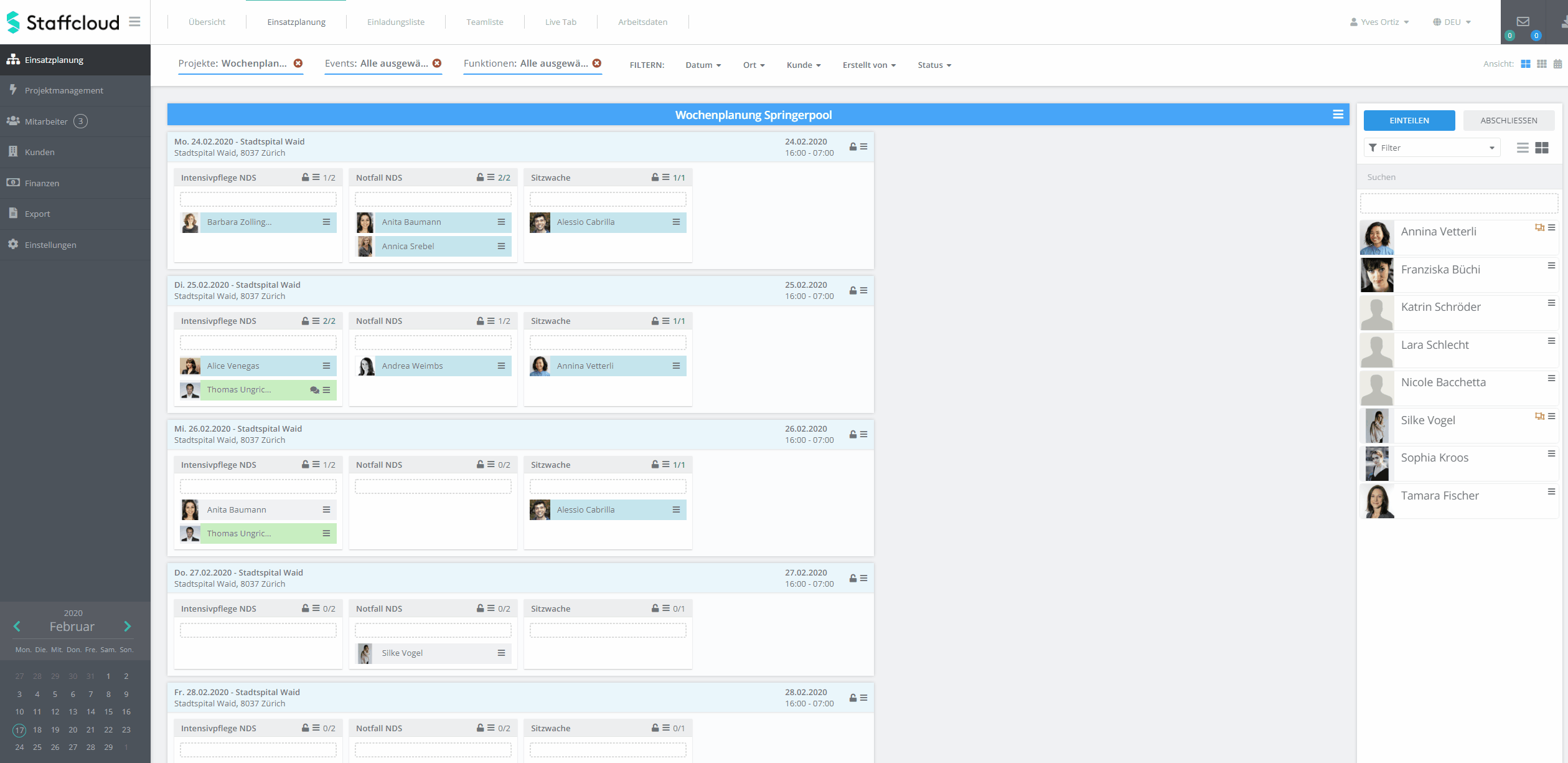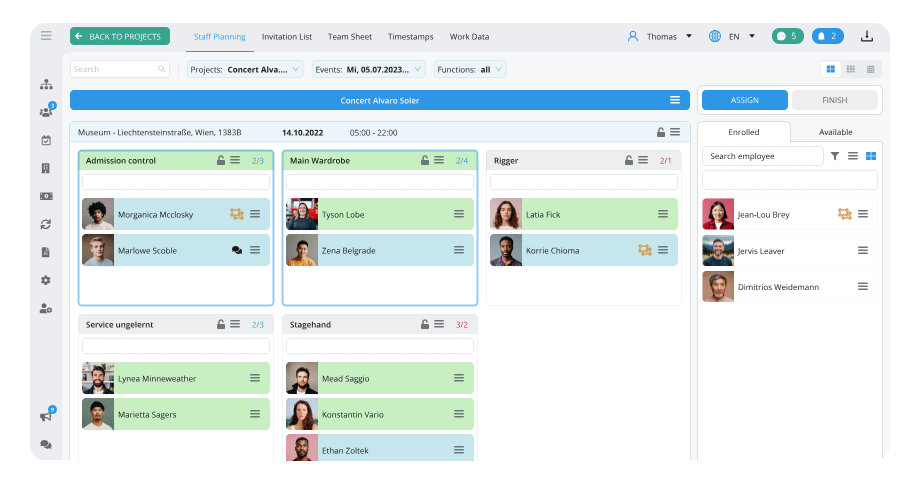Once again, you have no time off. Once again, you need to fill in for someone at short notice. If you are a carer or nurse, this may sound familiar, as you are often needed at short notice. When there are staff shortages, schedules change quickly. This is not only stressful for those who are called in, but increases the pressure for the entire ward. After all, until the much-needed help arrives, team members who are on site will have to pick up the slack.
However, hospitals are increasingly looking to float pools to solve this issue. Float pools are a model which allows for more predictable scheduling for nurses and carers, while still enabling wards to respond quickly to unplanned absences or a heavy workload.
In this article, will look at the float pool model in detail and examine the following:
- What exactly is a float pool
- Advantages and disadvantages of float pools
- Compensation for float pool staff
- Testimonials from float nurses
- Tips on scheduling with a float pool
What Exactly Is a Float Pool, and How Does It Work?
As opposed to on-call workers, staff members who are part of a hospital float pool are not waiting by the phone. Instead, just like any other nurse, they are usually part of a schedule and work regular hours. However, they do not have a concrete place of work. Instead, float nurses and carers are spontaneously assigned to whichever ward needs them the most.
Sometimes they will have an 'anchor ward' - for example, the ward where they were originally trained or where they normally spend the majority of their time. They will only be 'lent' to other parts of the hospital if necessary.
The float pool model is particularly beneficial if staff can spend several days or even weeks at a time within the same team, instead of being assigned to a new ward every day, since this gives them more of a chance to integrate into the team.
What Are the Advantages and Disadvantages of a Float Pool?
How comfortable float nurses are in their role is largely dependent on how well the float pool is implemented in their place of work. Generally, there are the following advantages and disadvantages:
|
Float pool advantages |
Float pool disadvantages |
|
|
For the hospital |
|
|
|
For nurses/ carers |
|
|
From this list, it is fairly obvious that the advantages outweigh the disadvantages for hospitals, but considering the downsides for staff members, you might be wondering why they decide to become float nurses or carers. After all, wouldn't it be easier to just stay in one ward and work there? However, as we will read about later, the frequent change of wards and insights into new areas of expertise not only suits certain people, but is seen as an asset by them.
How about Compensation - Do Float Nurses Earn More?
Generally, yes. Nurses and carers should be, and often are, compensated for both the additional burden they take on by being constantly trained in different areas, and the higher skill level they need.

"Every hospital has different pay structures for nurses. However, it is not uncommon to see float pool nurses make a higher hourly wage than their permanently assigned counterparts."
Aside from potentially earning more, float nurses are sometimes given more say in their own schedule. For example, they might be prioritised when it comes to not doing night shifts. However, how a float pool is organised and structured is ultimately up to the hospital.
When first introducing float pools, it is certainly advisable to create incentives by increasing pay and giving more desirable shifts to those who are willing to join them.
Testimonials from Float Nurses - This Is What They Say
We have looked at some forums to find testimonials (such as these) from people who have experienced working in a float pool model first hand. The overall tone is mixed, but most seem to have found the experience positive.
One testimonial reads:
"The float pool nurse has to be always ready to go to any assigned floor and perform nursing within their scope of practice. They are usually the 'gem' of the floor because they are always on the floor to save the crises situation that may have come up due to the shortage of staff on the floor."
And another:
"Enjoyed floating to different units and learning the nursing care on each. Management did support the float pool staff and gave kudos when due."
However, there are also critical voices, such as this review:
"Took float pool position for flexibility as it was nice to be able to work my own schedule. No benefits and often was sent home when scheduled to work due to low census. Poor communication between nurse manager, house manager, and myself which also resulted in being sent home after making the 30 min. commute to the hospital. Nurse to patient ratio was not optimal."
This underlines what we already know: float pools are fantastic, as long as they are implemented well. This means avoiding the following common issues:
- No time for proper training
- Float nurses can be taken advantage of if they do not understand and know the ward well
- Lack of integration into the team
In our next point, we will look at float pool scheduling and how, if done right, it can potentially help to avoid these problems, leading to a positive result for both wards and float nurses.
Float Pool Scheduling - What Needs to Be Considered?
One of the most frequently brought up criticisms of float pools is the confusion of float nurses who have trouble adjusting to a new ward. To address this issue and to ensure that your scheduling is a success, we have compiled some tips:
Communication is key
To ensure that float nurses can get acquainted with their new role for the next days or weeks, they should be given as much information as possible beforehand. If they don't know where they will be working until the last minute, this also leads to unnecessary stress.
To ensure communication between all parties is as smooth as possible, it can be helpful to implement a software system which sends out automatic assignment alerts rather than trying to leave all messages and phone calls to the person responsible for scheduling.
Take personal preferences into account
Additionally, it is helpful to address personal preferences (such as favourite work places or co-workers). Most nurses and care workers will have these and should be given the opportunity to voice them. Of course, these preferences cannot always be taken into account, but they may at times be helpful in deciding who to send where. After all, a happier staff member will likely do better work.
Qualifications matter
It may be obvious, but not every nurse has the right qualifications for each ward. It is therefore of particular importance that the right float nurse is picked for areas such as the operation theatre or intensive care.

Aside from those qualifications which are absolutely necessary, experience also plays a key part. It is advisable to assign float nurses to a ward they have worked in before to save on training time, and to make sure that they feel more comfortable in their role sooner.
Think about streamlining and plan for training times
Experience shows: those who streamline processes can simplify and shorten the training float nurses might need on other wards. One simple measure is having storage or laundry rooms with the same layout everywhere in the hospital.
However, even with more streamlined processes, you should not expect float nurses to know everything from day one. Instead, you should plan for one to three days of training time as a 'buffer'. Assigning float nurses to the same ward for as long as possible increases efficiency.
Use the right tools
Software solutions such as Staffcloud enable ward managers to pick the most suitable person for each job from the float pool. Staffcloud stores information on qualifications, working times, preferences and previous working experience, and matches staff with open positions.
Once a staff member is assigned, they receive a smartphone notification and can accept or decline the shift they have been given.
If you would like to find out more about our software solution, we are happy to give you a short demo to show you how hospitals can use Staffcloud to successfully work with float pools.

Find out more about Staffcloud today!









